
-
 Magritte painting nets auction record of $121 million
Magritte painting nets auction record of $121 million
-
Markets fluctuate as traders weigh geopolitical tensions

-
 Japanese, Koreans bottom of global love life survey
Japanese, Koreans bottom of global love life survey
-
Japan ramps up tech ambitions with $65 bn for AI, chips
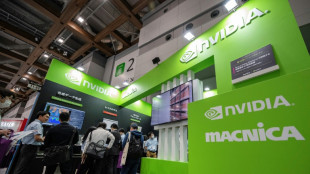
-
 Taliban govt clearing 'un-Islamic' books from Afghanistan shelves
Taliban govt clearing 'un-Islamic' books from Afghanistan shelves
-
Asian markets struggle as traders weigh geopolitical tensions

-
 Iraq holds its first census in nearly 40 years
Iraq holds its first census in nearly 40 years
-
SpaceX fails to repeat Starship booster catch, as Trump watches on
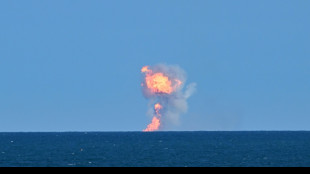
-
 European powers, US seek to censure Iran at UN nuclear watchdog board
European powers, US seek to censure Iran at UN nuclear watchdog board
-
SpaceX fails to repeat Starship booster catch, as Trump looks on

-
 European stocks fall on Ukraine-Russia fears, US focused on earnings
European stocks fall on Ukraine-Russia fears, US focused on earnings
-
Trump names China hawk Howard Lutnick commerce secretary

-
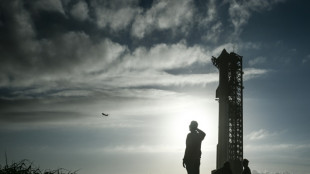 SpaceX set for Starship's next flight -- with Trump watching
SpaceX set for Starship's next flight -- with Trump watching
-
Top-selling daily French daily Ouest-France stops posting on X

-
 Russian invasion toll on environment $71 billion, Ukraine says
Russian invasion toll on environment $71 billion, Ukraine says
-
New Botswana leader eyes cannabis, sunshine to lift economy

-
 China's Xi urges 'strategic' ties in talks with Germany's Scholz
China's Xi urges 'strategic' ties in talks with Germany's Scholz
-
COP29 negotiators strive for deal after G20 'marching orders'

-
 Walmart lifts full-year forecast after strong Q3
Walmart lifts full-year forecast after strong Q3
-
Son of Norwegian princess arrested on suspicion of rape
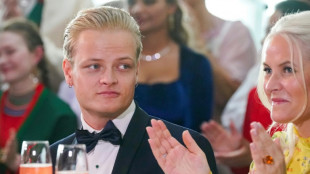
-
 US lawmaker accuses Azerbaijan in near 'assault' at COP29
US lawmaker accuses Azerbaijan in near 'assault' at COP29
-
Spain royals to visit flood epicentre after chaotic trip: media

-
 French farmers step up protests against EU-Mercosur deal
French farmers step up protests against EU-Mercosur deal
-
Burst dike leaves Filipino farmers under water

-
 Markets rally after US bounce as Nvidia comes into focus
Markets rally after US bounce as Nvidia comes into focus
-
Crisis-hit Thyssenkrupp books another hefty annual loss

-
 Farmers descend on London to overturn inheritance tax change
Farmers descend on London to overturn inheritance tax change
-
Floods strike thousands of houses in northern Philippines

-
 SpaceX set for Starship's next flight, Trump expected to attend
SpaceX set for Starship's next flight, Trump expected to attend
-
Several children injured in car crash at central China school

-
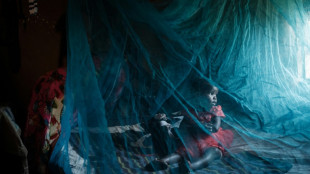 Urban mosquito sparks malaria surge in East Africa
Urban mosquito sparks malaria surge in East Africa
-
Many children injured after car crashes at central China school: state media

-
 Asian markets rally after US bounce as Nvidia comes into focus
Asian markets rally after US bounce as Nvidia comes into focus
-
Tens of thousands march in New Zealand Maori rights protest

-
 Five takeaways from the G20 summit in Rio
Five takeaways from the G20 summit in Rio
-
Parts of Great Barrier Reef suffer highest coral mortality on record

-
 Defiant Lebanese harvest olives in the shadow of war
Defiant Lebanese harvest olives in the shadow of war
-
Divided G20 fails to agree on climate, Ukraine

-
 Can the Trump-Musk 'bromance' last?
Can the Trump-Musk 'bromance' last?
-
US to call for Google to sell Chrome browser: report

-
 Trump expected to attend next Starship rocket launch: reports
Trump expected to attend next Starship rocket launch: reports
-
Stocks, dollar hesitant as traders brace for Nvidia earnings

-
 Biden in 'historic' pledge for poor nations ahead of Trump return
Biden in 'historic' pledge for poor nations ahead of Trump return
-
Tropical storm Sara kills four in Honduras and Nicaragua

-
 Spanish resort to ban new holiday flats in 43 neighbourhoods
Spanish resort to ban new holiday flats in 43 neighbourhoods
-
Phone documentary details Afghan women's struggle under Taliban govt

-
 G20 wrestles with wars, 'turbulence' in run-up to Trump
G20 wrestles with wars, 'turbulence' in run-up to Trump
-
Stocks, dollar hesitant as traders eye US rate outlook, Nvidia

-
 G20 wrestles with wars, climate in run-up to Trump
G20 wrestles with wars, climate in run-up to Trump
-
G20 host Brazil launches alliance to end 'scourge' of hunger


New 'vaccine-like' HIV drug could cost just $40: researchers
A new "vaccine-like" HIV drug that currently costs over $40,000 per person a year could be made for as little as $40, researchers estimated on Tuesday.
The antiretroviral drug Lenacapavir, developed by US pharmaceutical giant Gilead, has been hailed as a potential game-changer in the fight against HIV.
Early trials have found the treatment is 100 percent effective in preventing HIV infection. And it only needs to be injected twice a year, making the drug far easier to administer than current regimens requiring daily pills.
"It's like having a vaccine basically," Andrew Hill, a researcher at the UK's Liverpool University, told AFP.
The treatment currently costs patients over $40,000 a year in a range of countries including the United States, France, Norway and Australia.
New research, which Hill presented at the International AIDS Conference in Munich on Tuesday, looked into how much the cost of making the drug could come down if Gilead allowed for cheaper generic versions to be manufactured.
A year's worth of the drug could be made for as little as $40 -- 1,000 times less than the current price -- according to the research, which has not been peer reviewed.
This price was based on production volumes equal to treating 10 million people.
If the drug was given to people at high risk of contracting HIV -- such as gay or bisexual men, sex workers, prisoners or notably young women in Africa -- it could "basically shut down HIV transmission," Hill emphasised.
"We could actually control the epidemic."
There were 1.3 million new HIV infections last year, while 39 million people are living with the virus, according to the World Health Organization.
- 'Opportunity to save the world' -
To estimate the cost, the researchers studied shipments of raw materials of the drug, and spoke to large generic manufacturers in China and India that already make its "building blocks," Hill said.
The international team of researchers has been proven right about similar estimates in the past, he added.
A decade ago, the team said that the cost of making Gilead's hepatitis C drug -- then priced at $84,000 a patient -- could plummet to $100 if generics were allowed.
"Now it costs just under $40 to cure Hepatitis C," Hill said.
The new research was announced a day after UNAIDS chief Winnie Byanyima called on Gilead to "make history" by opening up Lenacapavir to the UN-backed Medicines Patent Pool, which would allow generics to be sold under licence in low- and middle-income nations.
"Gilead has an opportunity to save the world," she told AFP.
A Gilead spokesperson told AFP that the firm is still waiting on phase 3 clinical trial data on using Lenacapavir to prevent HIV, so "it is too early to state" what it could have in the future.
The firm has a strategy to "supply high-quality, low-cost versions of Lenacapavir" in countries "where the need is greatest," the spokesperson said.
It is also "moving with urgency" to negotiate contracts for a voluntary licencing programme to "expedite access to those versions of lenacapavir in high-incidence, resource-limited countries," the spokesperson added.
A.Mykhailo--CPN
